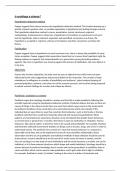Is sociology a science?
Hypothetico-deductive method
Popper suggests that science involves the hypothetico-deductive method. This involves drawing up a
specific research question, idea, or possible explanation (a hypothesis) and testing through research.
The hypothetico-deductive method is macro, quantitative, formal, structured, empirical
methodology. A phenomenon is observed, a hypothesis is formulated, an experiment is set up to
test the hypothesis, data is collected, organised, and quantified, conclusions are drawn, the
hypothesis is accepted or rejected, a theory is formulised, and other researchers scrutinise the
theory.
Falsification
Popper suggests that no hypothesis can ever be proven true, there is always the possibility of some
future exception. Popper suggests that researchers should not try to prove their hypothesis right (by
finding evidence in support), but instead should try to prove them wrong (by finding evidence
against). The more a hypothesis can stand up against this process of falsification, the more likely it is
to be true.
Objectivity
Science also involves objectivity, the data must be seen as objective facts which have not been
influenced by the value judgements and personal beliefs of the researcher. This consists of open
mindedness (a willingness to consider all possibilities and evidence), value freedom (keeping all
personal prejudices, opinions, and values out of the research process), and scrutiny (being prepared
to submit research findings for scrutiny and critique by others).
Positivists- sociology is a science
Positivists argue that sociology should be a science and that this is made possible by following the
scientific approach using the hypothetico-deductive method. Positivists believe that just as there are
causes of things in the natural world, there are social facts which cause events in the social world.
According to Durkheim, these social facts were social phenomena which exist outside of the
individual but act upon them in ways that constrain their behaviour, such as the family or the law.
Durkheim said that these social facts should be observed and measured quantitatively. When
patterns are found between social facts, theories can be formulated that predict future behaviour,
so we then have a ‘general law’ of society. This theory is open to verification or refutation. Human
behaviour, like natural matter, is therefore seen to be caused and predictable. For example, Mayhew
and Rowntree collected Government statistics on things such as income, drugs, and crime in order to
understand society. The positivist view consists of a view that human behaviour is a response to
observable social facts and can be explained in terms of cause and effect relationships, direct
observation and the use of quantitative and statistical methods of data collection should be used to
study society, research should focus on the search for social causes of events in society, and the
focus of sociology is on the study of social institutions and the social structure as a whole, not on the
individual, as it is these external structures which shape and mould individuals. Sociology should be a
science because it produces knowledge that is certain and can be generalised, it establishes laws of
cause and effect which can be used to make predictions, and it gains data that is high in reliability.
For example, Durkheim’s study ‘Le Suicide,’ looking at the rates of suicide in Protestants and




